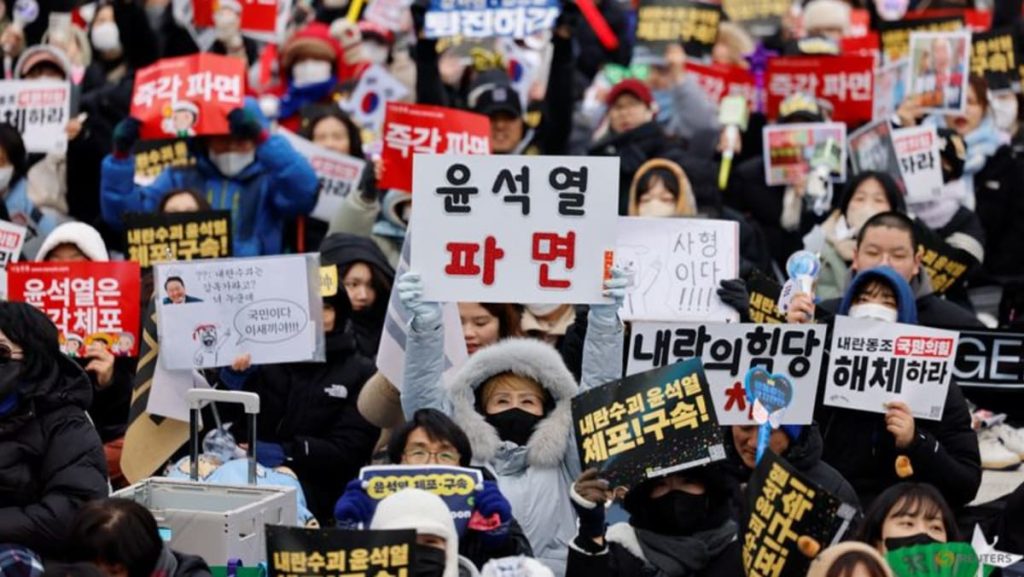The political landscape in South Korea has been roiled by a deeply divisive impeachment process targeting President Yoon Suk-yeol, sparking fervent protests and counter-protests that highlight the ideological fissures within the nation. Thousands of pro-Yoon demonstrators, predominantly older and identifying with conservative values, converged in a show of force against the impeachment efforts. Their primary objective was not only to resist Yoon’s removal but also to advocate for the full restoration of his presidential authority. This mobilized support underscores a segment of the population that remains firmly aligned with Yoon’s leadership and views the impeachment proceedings as an illegitimate attack. The gathering, which began around midday, reflects a concerted effort to exert public pressure and demonstrate the breadth of support for the embattled president.
At the heart of the pro-Yoon protests lies a deep-seated distrust of the parliamentary elections that preceded the impeachment drive. Many demonstrators believe these elections were marred by irregularities and manipulation, fueling their suspicion and anger. This sentiment was expressed by Lee Young-su, a 62-year-old businessman who voiced his opposition to the impeachment, characterizing the elections as “rigged.” He further articulated the belief that “socialist communist powers” are at the core of the effort to remove Yoon, indicating a fear of a leftward shift in South Korean politics. His perspective reflects a broader concern among conservatives that the impeachment process is politically motivated and serves as a tool to undermine Yoon’s agenda. This narrative of a hidden, subversive influence resonates with many demonstrators who see the impeachment as a threat to the established political order.
President Yoon’s justification for imposing martial law prior to the impeachment proceedings centered on allegations of election hacking and the presence of “anti-state” pro-North Korean sympathizers within the political system. These claims, however, have been categorically denied by the National Election Commission, adding another layer of complexity to the already tense situation. The stark contrast between Yoon’s assertions and the official denial has further polarized public opinion, with supporters accepting his claims as truth while opponents view them as an attempt to seize power illegitimately. This clash of narratives has fueled the ongoing political turmoil and deepened the mistrust between opposing factions.
The pro-Yoon protests represent a powerful expression of popular support for the president and a rejection of the impeachment efforts. The demonstrators, many of whom are older and more conservative, see Yoon as a bulwark against the perceived threat of socialist and communist influences. They view the impeachment as an undemocratic attempt to overturn the will of the people and remove a leader they believe is acting in the best interests of the nation. Their vocal opposition highlights the challenges facing the impeachment process and underscores the deep political divisions within South Korean society.
The claims of election hacking and the presence of pro-North Korean sympathizers, while denied by the National Election Commission, have significantly contributed to the political unrest. These accusations, regardless of their veracity, have resonated with a segment of the population that is already distrustful of the current political landscape. They serve to legitimize the pro-Yoon movement and reinforce the conviction that the impeachment is a politically motivated maneuver. The ongoing dispute over the validity of these claims continues to fuel the fire of political division, making a resolution even more challenging.
The impeachment proceedings against President Yoon have plunged South Korea into a period of profound political uncertainty. The protests demonstrate the passionate support Yoon retains among a segment of the population, primarily older and conservative individuals. This vocal opposition, coupled with the controversial claims of election manipulation and anti-state activities, has created a highly charged political atmosphere. The future of South Korean politics hinges on navigating these deep divisions and finding a path towards resolution that respects the democratic process while addressing the underlying concerns that have fueled this crisis. The road ahead is fraught with challenges, requiring careful and considered action to restore stability and unity within the nation.

